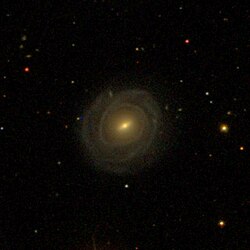NGC 4326
| NGC 4326 | |
|---|---|
 SDSS image of NGC 4326. | |
| Observation data (J2000 epoch) | |
| Constellation | Virgo |
| Right ascension | 12h 23m 11.6s[1] |
| Declination | 06° 04′ 20″[1] |
| Redshift | 0.023756[1] |
| Heliocentric radial velocity | 7122 km/s[1] |
| Distance | 330 Mly (102 Mpc)[1] |
| Apparent magnitude (V) | 14.19[1] |
| Characteristics | |
| Type | SAB(r)ab+[1] |
| Size | ~200,700 ly (61.54 kpc) (estimated)[1] |
| Apparent size (V) | 1.5 x 1.1[1] |
| Other designations | |
| UGC 07454, VCC 0623, PGC 040192, MCG +01-32-033, CGCG 042-064[1] | |
NGC 4326 is a barred spiral galaxy with a ring[2] located about 330 million light-years away[3] in the constellation Virgo. It was discovered by astronomer William Herschel on April 13, 1784,[4] who described it as "vF, S, R, bM, 1st of 3".[5] It is a large galaxy, with a diameter of around 200,000 ly (61 kpc) making it nearly twice the size of the Milky Way.[3] NGC 4326 is also classified as a LINER galaxy.[6] Despite being listed in the Virgo Cluster catalog as VCC 623, it is not a member of the Virgo Cluster but instead a background galaxy.[7]
NGC 4326 is host to a supermassive black hole with and estimated mass of 3.7×108 solar masses.[8]
Nearby Galaxies
NGC 4326 forms a pair with the galaxy NGC 4333, known as [T2015] nest 102514,[9][10] in which NGC 4326 is the birghtest member of the pair.[10] Both galaxies are part of the CfA2 Great Wall.[11]
See also
External links
- NGC 4326 on WikiSky: DSS2, SDSS, GALEX, IRAS, Hydrogen α, X-Ray, Astrophoto, Sky Map, Articles and images
References
- ^ a b c d e f g h i j "NASA/IPAC Extragalactic Database". Results for NGC 4326. Retrieved 2022-02-21.
- ^ "HyperLeda -object description". leda.univ-lyon1.fr. Retrieved 2022-02-22.
- ^ a b "Your NED Search Results". ned.ipac.caltech.edu. Retrieved 2022-02-22.
- ^ "New General Catalog Objects: NGC 4300 - 4349". cseligman.com. Retrieved 2022-02-19.
- ^ "NGC/IC Project Restoration Efforts". ngcicproject.observers.org. Retrieved 2022-02-22.
- ^ "NGC 4326". simbad.u-strasbg.fr. Retrieved 2022-02-22.
- ^ Binggeli, B.; Sandage, A.; Tammann, G. A. (September 1985). "Studies of the Virgo Cluster. II - A catalog of 2096 galaxies in the Virgo Cluster area. V - Luminosity functions of Virgo Cluster galaxies". The Astronomical Journal. 90: 1681. Bibcode:1985AJ.....90.1681B. doi:10.1086/113874.
- ^ Arzoumanian, Zaven; Baker, Paul T.; Brazier, Adam; Brook, Paul R.; Burke-Spolaor, Sarah; Becsy, Bence; Charisi, Maria; Chatterjee, Shami; Cordes, James M.; Cornish, Neil J.; Crawford, Fronefield; Cromartie, H. Thankful; Decesar, Megan E.; Demorest, Paul B.; Dolch, Timothy (2021-06-01). "The NANOGrav 11 yr Data Set: Limits on Supermassive Black Hole Binaries in Galaxies within 500 Mpc". The Astrophysical Journal. 914 (2): 121. arXiv:2101.02716. Bibcode:2021ApJ...914..121A. doi:10.3847/1538-4357/abfcd3. ISSN 0004-637X.
- ^ "[T2015] nest 10214". simbad.u-strasbg.fr. Retrieved 2022-02-22.
- ^ a b Tully, R. Brent (2015-05-01). "Galaxy Groups: A 2MASS Catalog". The Astronomical Journal. 149 (5): 171. arXiv:1503.03134. Bibcode:2015AJ....149..171T. doi:10.1088/0004-6256/149/5/171. ISSN 0004-6256. S2CID 119285986.
- ^ Hoffman, G. Lyle; Lewis, B. M.; Salpeter, E. E. (1995-03-01). "The Large-Scale Distribution of Late-Type Galaxies between Virgo and the Great Wall". The Astrophysical Journal. 441: 28. Bibcode:1995ApJ...441...28H. doi:10.1086/175333. ISSN 0004-637X.
